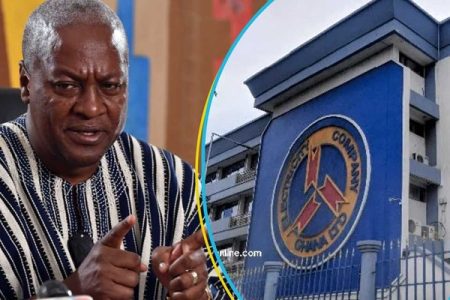President John Dramani Mahama has hinted at plans to privatize the Electricity Company of Ghana (ECG) as part of efforts to tackle inefficiencies in the country’s power distribution sector.
The proposal, which previously faced resistance from labour unions, civil society groups, and other stakeholders, is part of a broader strategy to modernize Ghana’s energy infrastructure and improve service delivery to meet the growing demands of the economy.
During a meeting with a World Bank delegation led by Mr. Ousmane Diagana, Vice-President for West and Central Africa, President Mahama emphasized the need for private sector involvement to address financial mismanagement, operational inefficiencies, and inadequate service delivery at ECG.
Historical context and previous interventions
Since its inception, ECG has engaged in various Private Sector Participation (PSP) agreements aimed at improving operational efficiency, expanding infrastructure, and reducing losses in electricity distribution.
A significant milestone in this effort was the Millennium Challenge Compact II, a U.S. government initiative under the Millennium Challenge Corporation (MCC), which focused on reforming ECG.
A key aspect of the MCC intervention included privatization efforts involving Power Distribution Services (PDS).
However, the PDS agreement was terminated due to unresolved challenges, leaving the future of ECG’s privatization uncertain. President Mahama highlighted these setbacks but expressed Ghana’s readiness to renegotiate with the U.S. Government for the reinstatement of $190 million under the MCC that had been allocated to the electricity sector.
Reflecting on his tenure as Vice-President under the late President Professor John Evans Atta Mills, President Mahama recalled signing the original MCC agreement aimed at making Ghana the most efficient producer of electricity in Africa.
“Unfortunately, democracy has its dividends, but it also sometimes can be a curse. A new government took over, and PDS is now history,” he remarked.
Despite these challenges, the President remains committed to reviving the privatization agenda to strengthen ECG’s operations.
Immediate plans and stakeholder engagement
President Mahama stressed the importance of private sector efficiency in transforming ECG. Speaking from his residence in Accra, he said, “If we don’t fix the Electricity Company of Ghana, we will continue to have a major problem with our whole power value chain.”
He assured stakeholders that the privatization process would involve extensive consultations to balance public interest with the need for improved performance.
The President also revealed plans to pursue discussions with the MCC and seek support from the World Bank to complete key reforms.
“If we don’t have access to the $190 million from MCC, we will need the World Bank’s support to reduce the losses associated with independent power producers (IPPs),” he noted.
In the interim, measures such as restoring transparency and stabilizing the cash waterfall mechanism will be implemented.
Challenges in the energy sector
President Mahama acknowledged the challenges faced during his previous administration, including decisions that raised concerns. However, he expressed optimism about Ghana’s capacity to overcome these difficulties.
“We need to reset this country and put it back on track in terms of economic stability,” he said, outlining priorities such as job creation, poverty elimination, and empowering women.
The President also pointed to a significant decline in foreign direct investment (FDI) under the outgoing administration, which dropped from $3.3 billion annually during his first term to just over $1 billion recently.
This, he said, underscores the urgency of stabilizing the economy and creating a favorable environment for business growth.
Path forward
As Ghana seeks to revitalize its energy sector, President Mahama emphasized the importance of collaboration with international partners like the World Bank.
“We want to work with the World Bank to turn things around as quickly as possible,” he concluded, highlighting the potential of partnerships to drive economic growth and energy sector reforms.
With the privatization of ECG back on the agenda, all eyes are on how the government and private stakeholders will work together to implement the necessary changes to secure a stable and efficient power distribution system for Ghana’s future.
World Bank’s Support for Ghana
Mr. Diagana, who was in Accra to attend President Mahama’s inauguration, reiterated the World Bank’s commitment to supporting Ghana’s development agenda.
He acknowledged the difficulties in the energy sector, stating, “The energy sector is one that has given us a lot of trouble. We are committed to supporting Ghana in addressing these challenges and ensuring sustainable development.”
He said the Bank had dedicated programmes that exist already in Ghana to contribute to addressing those challenges that the President had mentioned; saying “the energy sector is one that has given us a lot of trouble. A lot of headaches”.
- Military service commanders sworn into Armed Forces Council - 25 April 2025
- Finance Minister unveils plan to tackle 2024 payables - 25 April 2025
- 2 potential flagbearers donate GH¢3m and GH¢1m to NPP - 25 April 2025

